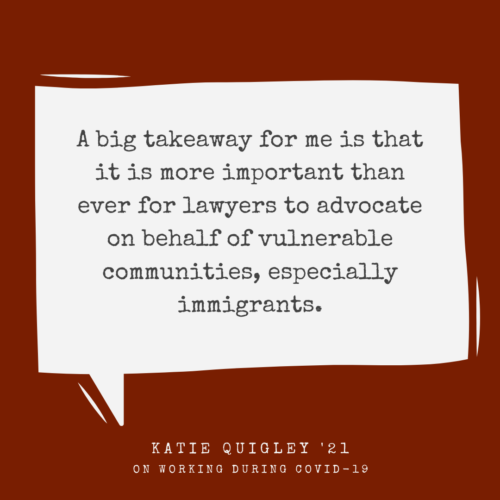
While many businesses and institutions across the country have temporarily closed due to COVID-19, students, staff, and attorneys at the Harvard Immigration and Refugee Clinical Program (HIRC) have continued to work with clients throughout the pandemic. Since all work has moved remote, HIRC has had to adapt to new restrictions and rules in order to continue to provide top-notch representation to our clients.
Immigration application deadlines remain largely unchanged in the times of COVID-19, and so casework remains steady at HIRC. Clinical Instructor Cindy Zapata supervised Drew Heckman ’20 and Rosa Baum ’21 as they prepared various materials, ranging from employment reauthorizations to a Freedom of Information Act (FOIA) request to a Special Immigrant Juvenile Status (SIJ) application. Previously, clients would come to the HIRC office to sign physical forms; however, with new social distancing rules, clients have had to find a way to send forms electronically. Heckman described the challenge he and Baum faced when trying to work remotely with their young SIJ client: “It was a real debacle explaining — in Spanish, over Zoom, to someone who had never really used a laptop before — how to find my email, download the document, digitally sign it in Adobe, re-save it, reattach the new version to an email, and send it back to me. But after about half an hour, we did it!”
Students working with HIRC Director Sabi Ardalan also had to tackle new obstacles now that clients and attorneys could no longer meet in person. Soon after campus closed, clinical students Katie Quigley ’21 and Benjamin Antillon Fernandez ’21 found themselves facing a filing deadline for their client who was seeking asylum. To make matters more complicated, Quigley and Antillon Fernandez had only been able to meet their client in-person once and now had to acquire intimate details of the harm their client had suffered in her home country in order to complete the filing. “It is crucial to gain the client’s trust,” Antillon Fernandez explained. “And meeting them in person multiple times is critical for that.” However, despite the difficult circumstances, their client rose to the occasion and bravely opened up to the students, which ultimately allowed them to submit their filing on time.
In addition to submitting myriad applications and filings, some students have even continued forward with court appearances. At the Crimmigration Clinic, students Michael Hur ’20 and Sarah Libowsky ’20 worked with Crimmigration Clinic Director Phil Torrey to prepare for a hearing in the District Court of Massachusetts, which was held over Zoom. In preparation for the hearing, they spent many hours on Zoom conducting moots to not only develop their legal arguments, but also to prepare for any possible technological issues. At the hearing, the Crimmigration team successfully secured a new bond hearing for their client and, though his bond was later denied, Libowsky noted she felt proud that they were able to take every step possible to advocate for their client’s release. Hur also noted that “the experience really showed the pandemic’s disproportionate impact on the populations and communities we serve.”
Detainees face particularly grave concerns in light of the growing pandemic and HIRC staff and attorneys have been working tirelessly on behalf of our clients currently in detention. At HIRC at GBLS, Co-Assistant Directors Nancy Kelly and John Willshire Carrera worked with Allen Song ’20 on the case of a detained client who was facing expedited removal. Through collaboration with the ACLU, they were able to file a habeas petition that eventually led to their client’s release. However, their work did not end there. Song called their client after his release and worked with him to prepare an affidavit regarding the conditions inside the detention center. Song expressed grave concern over what he heard from his client, noting that, in his opinion, “the government was clearly failing to protect [detainees] dignity and right to health and life.”
Clinical student Norah Rast ’21, who worked on a detained case along with Zachary Manley ’21, echoed her fellow student’s concern over the health and well-being of detainees. As their client awaited an Eleventh Circuit Court of Appeals decision, she and Manley, along with supervisor Sabi Ardalan, spent hours advocating for other forms of relief for their client, including habeas litigation, a bond request, and a request for humanitarian parole. Though their client remains in detention, they won a stay of his removal from the Eleventh Circuit, and the clinic will continue to advocate for his release and a grant of his appeal.
Immigration advocacy work is filled with challenges and COVID-19 has amplified and complicated these obstacles facing advocates. Despite these difficult times, HIRC students remain determined to serve their clients. When asked to reflect on her experience over the past month, Katie Quigley said, “a big takeaway for me is that it is more important than ever for lawyers to advocate on behalf of vulnerable communities, especially immigrants.” This type of resilience is a common thread among our students at HIRC. When faced with a seemingly insurmountable obstacle, they see it as a call to action. Whether our students are continuing with HIRC or moving on to new adventures, we hope they continue to carry this sense of purpose and dedication with them on their journey as legal advocates.